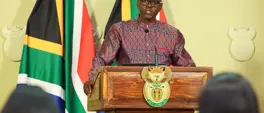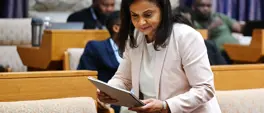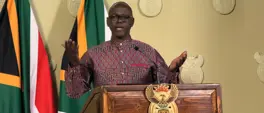MALAIKA MAHLATSI: The weaponisation of anti-Semitism endangers us all
Malaika Mahlatsi
15 November 2024 | 11:49What countries or people casually weaponising anti-Semitism fail to realise, is that rather than protect Jewish life, they are putting Jewish communities in danger by exacerbating the false equivalency between Jews and Zionists, writes Malaika Mahlatsi.
A week ago, clashes involving supporters of Israel football club, Maccabi Tel Aviv, and pro-Palestinian supporters, broke out in Amsterdam.
The Israeli team was playing against Ajax, a Dutch club based in the capital city of The Netherlands. Soon thereafter, world leaders came out to condemn what they claimed were “anti-Semitic” attacks on Israeli nationals, with some going as far as to refer to the clashes as pogroms.
Pogroms are violent riots incited with the aim to massacre or expel an ethnic or religious group – particularly Jews. They were carried out by the Russian Empire in the 19th and 20th centuries, with support from the imperial regime.
The Israeli state responded to the clashes in Amsterdam by sending aircraft to evacuate its citizens, cementing the idea that the Maccabi Tel Aviv fans had been victims of “anti-Semitism” and needed protection.
But soon, reports came out that dismantled the false narrative of Maccabi fans being victims, and they were exposed as instigators of the violence.
Journalists and residents of Amsterdam such as cultural anthropologist, Marie-Jośe van Schaik, gave an account of how, in the days leading up to the match, warnings had circulated in activist groups warning people of Arab “appearance” to exercise caution in Amsterdam by not wearing the keffiyeh or visible symbols of Palestinian solidarity.
On the night before the match, Maccabi fans went around Amsterdam pulling down Palestinian flags from private buildings, throwing rocks and attacking taxi drivers. They were also heard around the city chanting anti-Arab slogans and singing racist songs targeting Muslims.
Dutch police did nothing, even as residents of Amsterdam reported feeling unsafe.
Viral videos show that on the day of the match, Maccabi fans went into the stadium chanting songs glorifying the genocide in Palestine, with lyrics such as “Let the IDF f*** the Arabs” (the IDF is the Israeli Defense Force) and “There are no schools in Gaza because there are no children left”.
Also, a week ago, Germany passed a resolution that seeks to define the criticism of Israel as anti-Semitism. Anti-Semitism is hostility to, prejudice towards, or discrimination against Jews. It is rooted in racism and expresses itself in the persecution of Jews.
The most heinous expression of anti-Semitism was the Holocaust in which more than six million Jews were killed by the Nazi regime in Germany and other parts of Europe.
While anti-Semitism is undeniably an injustice, what the German government is proposing is something that scholars are referring to as “new anti-Semitism”.
While the concept is not new, having emerged in literature in the 1970s, it has gained popularity owing to the actions of the Israeli state in the unfolding genocide in Palestine. According to this concept, since Israel is a Jewish state, expressions of anti-Zionist positions are effectively anti-Semitism.
Natan Sharansky, an Israeli politician and author, developed what he calls a 3D test to determine new anti-Semitism. He contends it is the demonisation of Israel, the double standard of disproportionate criticism of Israel, and the delegitimisation of Israel’s right to exist.
Taking this further, the German government wants to criminalise not only the demonisation but the criticism of Israel.
This means that anyone in Germany who criticises the Zionist project of illegally occupying land in Palestinian territories (an act that is a violation of international law); anyone who refers to what is happening in Palestine as a genocide (the International Court of Justice has ruled that there exists prima facie evidence of genocide in Palestine); anyone who calls Israel an apartheid state (apartheid is a system of institutionalised segregation and discrimination, which is happening in Israeli-occupied Palestinian territories); or anyone who openly disagrees with Israel on anything at all, may be punished through various mechanisms including having their German residency and citizenship revoked, being denied access to public funding or even expelled from university.
I have no doubt that Germany can do this, because it’s been doing it even without any resolution being passed by the Bundestag. As a doctoral student in Germany, I have been subjected to investigations by the police and the Office of the Public Prosecutor in Gottingen for my pro-Palestinian views.
While no evidence was found to charge me, leading to the investigation being closed, the fact that I was accused of “rewarding and supporting a terrorist event” for standing on the side of Palestinian people in the face of a genocide that has claimed the lives of more than 42,000 people - more than half of them being women and children, is all the evidence needed that Germany is hellbent on supporting the Zionist project, even if it means standing on the wrong side of international law.
The ever-increasing number of people who are being denied their legal right to protest Germany’s foreign policy within Germany is also evidence of the country’s retreat from the protection of fundamental human rights, including the right to assembly and freedom of expression.
These rights are being trampled on in the name of “anti-Semitism”, even as many Jewish scholars globally have sounded the alarm on the misuse and weaponisation of the term.
The events in Amsterdam and developments in Germany reflect the dangerous weaponisation of Jewish safety and identity. In Amsterdam, Israeli nationals were allowed to engage in violent and disruptive behaviours, and then shielded from accountability by the “anti-Semitism” card.
Palestine has been bombed to smithereens by the Zionist state, its people massacred, and its infrastructure destroyed. This is said to be about defending the right of Israel to exist.
But Israel does exist. It is a recognised state with a strong economy and immense power. It is Palestine, now a graveyard, whose right to exist is under threat. Yet, Palestinians must be massacred, their homes destroyed and illegally occupied, their fields scorched so that they may starve to death – all of this for Israel to exist.
And Germany says to criticise this is to be anti-Semitic.
What Germany and all those who so casually weaponise anti-Semitism fail to realise is that rather than protect Jewish life, they are putting Jewish communities in danger by exacerbating the false equivalency between Jews and Zionists.
Even the idea that all Jews should hold the same views by virtue of their identity is an anti-Semitic idea itself, as aptly argued by Raz Segal, an associate professor of Holocaust and Genocide Studies and an endowed professor in the study of modern genocide at Stockton University.
In an article titled "How weaponising antisemitism puts Jews at risk” published in Time, he contends that the Gaza solidarity encampments in the United States, rather than promote anti-Semitism, are, in fact, anti-racist spaces where Jews, Palestinians, Arabs, Christians, Muslims, Black people, men, women, the LGBTIQ+ community and others, stand in solidarity against genocide.
This, he argues, is a fight for a different and progressive future. This is the future that Germany and those who weaponise anti-Semitism must be striving for.
Malaika Mahlatsi is a geographer and researcher at the Institute for Pan African Thought and Conversation. She is a PhD candidate at the University of Bayreuth in Germany.
Get the whole picture 💡
Take a look at the topic timeline for all related articles.
Trending News
More in Opinion

12 December 2025 15:34
CHARLES MATSEKE | The Republic of commissions arrives at its point of no return

12 December 2025 14:15
REBONE TAU | Ekurhuleni needs bold, decisive leaders to reverse years of capture

12 December 2025 05:13
MANDY WIENER | Searching for a superhero with a spine of steel: Why the position of NDPP matters so much











